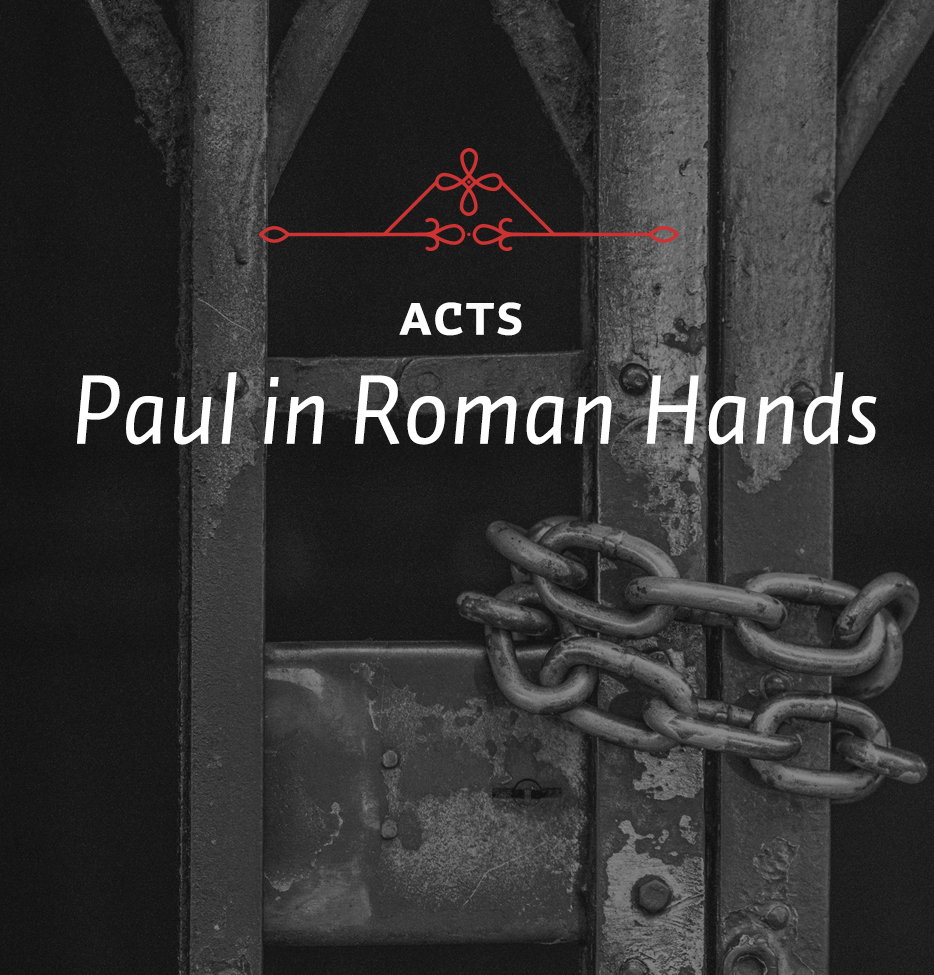Paul had been a free ambassador of Jesus Christ for nearly twenty years, but in Acts 22 he passes from being a free man to being a prisoner of the Roman state. We would think that being in Roman hands would be worse than being in Jewish hands. But we soon discover that Paul was better off in the hands of the secular authorities than he would have been in the hands of his own people. They were trying to kill him, after all.
The section we are going to look at in this week’s study has three parts. First, we see Paul and the Romans (Acts 22:23-29). Second, we see Paul and the Jewish authorities, the Sanhedrin who were the leaders of Paul’s people (Acts 22:30-23:10). Third, we see Paul and the Lord (Acts 23:11).
We have already looked at the opening scene of the drama. Paul had gone into the temple precincts to fulfill a vow he had taken and offer a sacrifice along with four men who were undergoing a purification rite with him. There were Jews from Asia present in Jerusalem—perhaps from Ephesus, where Paul was a well-known figure—and these men started a riot, saying that Paul had taken a Gentile into the temple. This was not true, as Luke points out. But it was said, and it caused such a tumultuous riot that the commander of the Roman garrison had to send soldiers into the courtyard to rescue Paul.
As they were leading him away, Paul asked to speak to the people. He spoke in Aramaic, which initially quieted them down. But when he got to the point of recounting how the Lord had instructed him to go to the Gentiles, the very mention of the word “Gentiles” set them off again, and the Romans had to intervene once more and lead Paul out.
The commander had a problem. His job was to keep order in the city. In order to do that, he had to understand what was going on. He had thought, no doubt, when Paul had quieted the people down, that the worst was probably over. He probably didn’t understand Aramaic, at least not well. But at least the people were quiet. Suddenly, however, this great commotion broke forth again, and he must have been puzzled. Besides, what was he to do? He must have concluded that there was something underneath this that he had just not been told, something Paul was guilty of but had not confessed. So he thought, “The only way we’re going to get to the bottom of this is by torture. I’ll have to force this man to tell us what is causing the trouble, because until we do that, I’ll never be able to restore order in the city.”
So they took Paul away and stretched him out to flog him. This was not the normal Jewish flogging, which was bad enough, but the dreaded Roman flagellum. It was a beating so severe that in some cases it resulted in the death of the victim. It was what was done to Jesus before his crucifixion. As they were about to begin this dreaded punishment, Paul asked a question: “Is it legal for you to flog a Roman who hasn’t even been found guilty?” (v. 25).
It was not lawful, of course, and Paul knew it. In fact, everyone knew it. So when the soldier in charge of the beating heard Paul’s question he immediately broke off his preparation for the beating, went to the commander and said, “You had better be careful. This man is a Roman citizen.”
The officer went to Paul. “Is this true? Are you a Roman?” he asked.
“Yes, I am.”
That was not something anyone would lie about, of course. If a person claimed Roman citizenship falsely and was later discovered to have lied, the penalty was death. So if Paul said he was a Roman citizen, it was no doubt true. The officer assumed he could have proved it.
That changed things, of course. So the commander, now with quite a different attitude, began to converse with Paul, questioning him as to how he had secured his citizenship. He said, “I had to pay a great price for mine.” To judge by his name, Claudius Lysias, this man was a Greek who had probably purchased his citizenship during the reign of the emperor Claudius and had named himself after him. It also fits well with what we know to have been happening at that time. Claudius’ administration had sold citizenships to raise money, and the commander had purchased such a citizenship.
But Paul replied that he had not purchased his citizenship. He had been born a Roman citizen. This meant that Paul’s father was a Roman citizen. We do not know how. He might have been awarded it because of some great service to the state; it might be that his father before him had been a Roman citizen; it might be that Paul’s father had purchased his citizenship, in which case, Paul would have come from a family of some means, which we have reason for suspecting on other grounds. But we really do not know. All we know is that Paul was a citizen, and on the basis of that fact he was immediately spared the flogging. It had even been a fault to have bound him, but that was a lesser offense and was forgotten. Certainly Paul was not about to press it.






